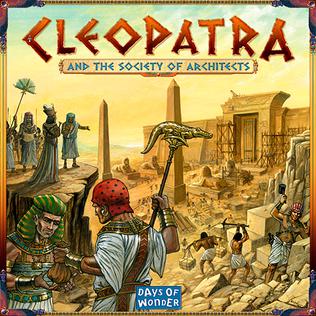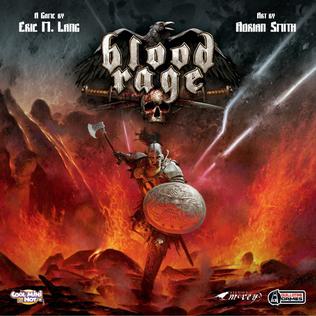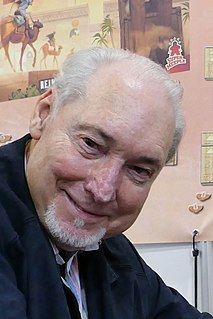
Puerto Rico is a Euro-style board game designed by German designer Andreas Seyfarth, and published in 2002 by Alea in German, by Rio Grande Games in English, by Grow in Brazilian Portuguese, and by Κάισσα in Greek. Players assume the roles of colonial governors on the island of Puerto Rico during the age of Caribbean ascendancy. The aim of the game is to amass victory points in two ways: by exporting goods and by constructing buildings.
Zombies!!! is a tile-based strategy board game for two to six players. Zombies!!! won the 2001 Origins Award for Best Graphic Presentation of a Board Game, and Zombies!!! 3: Mall Walkers won 2003's Origins Award for Best Board Game Expansion.

Citadels is a German-style card game, designed by Bruno Faidutti, originally published in French as Citadelles by MultiSim in 2000, illustrated by Julien Delval, Florence Magnin, Jean-Louis Mourier and Cyrille Daujean as graphic designer for the first edition. Sometime later, Citadels was published in German as Ohne Furcht und Adel, which means "Without Fear or Nobility".

Shadows over Camelot is an Arthurian-themed board game designed by Serge Laget and Bruno Cathala, illustrated by Julien Delval and Cyrille Daujean. The game was unveiled by the publishers Days of Wonder at the 2005 American International Toy Fair and was more widely released in May and June 2005. The game was also published in French as Les Chevaliers de la Table Ronde and in German as Schatten über Camelot. In 2008, an expansion for Shadows over Camelot was released titled Merlin's Company.

Shogun is a strategy board game designed by Dirk Henn and published by Queen Games in 2006. It is based on his earlier game Wallenstein, but it is set in the Sengoku period, which ends with the inception of the Tokugawa Shogunate.
BattleLore is a strategy board wargame for two players, created by Richard Borg and initially published by Days of Wonder in 2006. The game is based on the same mechanics as Battle Cry, Memoir '44 and Commands & Colors: Ancients, but has a fantasy and medieval theme.

Cleopatra and the Society of Architects is a board game by Bruno Cathala and Ludovic Maublanc, published in 2006 by Days of Wonder, illustrated by Julien Delval and Cyrille Daujean. In the game, players attempt to become the richest architect that survives the building of Cleopatra's palace.

7 Wonders is a board game created by Antoine Bauza in 2010 and originally published by Repos Production in Belgium. 7 Wonders is a card drafting game that is played using three decks of cards featuring depictions of ancient civilizations, military conflicts and commercial activity. The game is highly regarded, being one of the highest rated games on the board game discussion website BoardGameGeek. 7 Wonders has won a total of more than 30 gaming awards, including the inaugural Kennerspiel des Jahres connoisseurs' award in 2011.

Space Alert is a team survival designer board game created by Vlaada Chvátil in 2008. Players assume the roles of space explorers on a mission to survey the galaxy. The crew is evaluated on teamwork and how they deal with problems that arise on their journey. Unlike most board games, in Space Alert, players need to make decisions and play cards in real time. It was given a special prize for "New Game Worlds" in the 2009 Spiel des Jahres awards.

Galaxy Trucker is a science-fiction board game for two to four players. The game was developed by Vlaada Chvatil, with graphics designed by Radim Pech. The Czech version of the game was released in 2007 by Czech Games Edition, and a German version was published in the same year by Heidelberger Spieleverlag.

Mansions of Madness is a tabletop strategy game designed by Corey Konieczka and published by Fantasy Flight Games in 2011. Players explore a locale filled with Lovecraftian horrors and solve a mystery.

King of Tokyo is a tabletop game using custom dice, cards, and boards, designed by Richard Garfield and released in 2011. A New York City-based edition, King of New York, was published in 2014. A new version of the game was released in 2016, with all new artwork and characters, as well as mutant monsters, gigantic robots and other creatures.

Eclipse: New Dawn for the Galaxy is a strategy board game produced by Lautapelit.fi. It was designed by Touko Tahkokallio and first released in 2011. The game currently has three expansions — Rise of the Ancients, released in 2012, Ship Pack One, released in 2013 and Shadow of the Rift, released in 2015 — and four mini expansions.

Freedom: The Underground Railroad is a 2013 co-operative board game designed by Brian Mayer and published by Academy Games, their first game in the Freedom Series. The game has drawn positive attention for its approach and handling of the topic.

Splendor is a multiplayer card-based board game, designed by Marc André and illustrated by Pascal Quidault, first published in 2014 by Space Cowboys. The board consists of cards laid out in a grid. Players are gem merchants of the Renaissance buying gem mines, transportation, and shops. The game was nominated for the 2014 Spiel des Jahres.
Evolution: The Origin of Species is a card game created by Dmitriy Knorre and Sergey Machin in 2010. The game is inspired by the evolutionary biology. It was published by SIA Rightgames RBG. English, French and German game editions were published in 2011. Two or more players create their own animals, make them evolve and hunt in order to survive.
Colt Express is a railway-themed family board game designed by Christophe Raimbault, Illustrated by Ian Parovel and Jordi Valbuena, published in 2014 by Ludonaute and distributed by Asmodee.

Blood Rage is a Viking themed board game designed by Eric Lang and published by CoolMiniOrNot in 2015. Each player controls a clan of mythological Vikings seeking glory as Ragnarok approaches. Played in three ages or rounds, Blood Rage features card drafting, battles and territory control via forces represented by sculpted plastic miniatures. All conflicts are resolved through playing cards, and cards are also used to improve and differentiate the different clans and the leaders, warriors, ships and monsters at their command.

Azul is an abstract board game designed by Michael Kiesling and released by Plan B Games in 2017. Based on Portuguese tiles called azulejos, in Azul players collect sets of similarly colored tiles which they place on their player board. When a row is filled, one of the tiles is moved into a square pattern on the right side of the player board, where it garners points depending on where it is placed in relation to other tiles on the board.



















